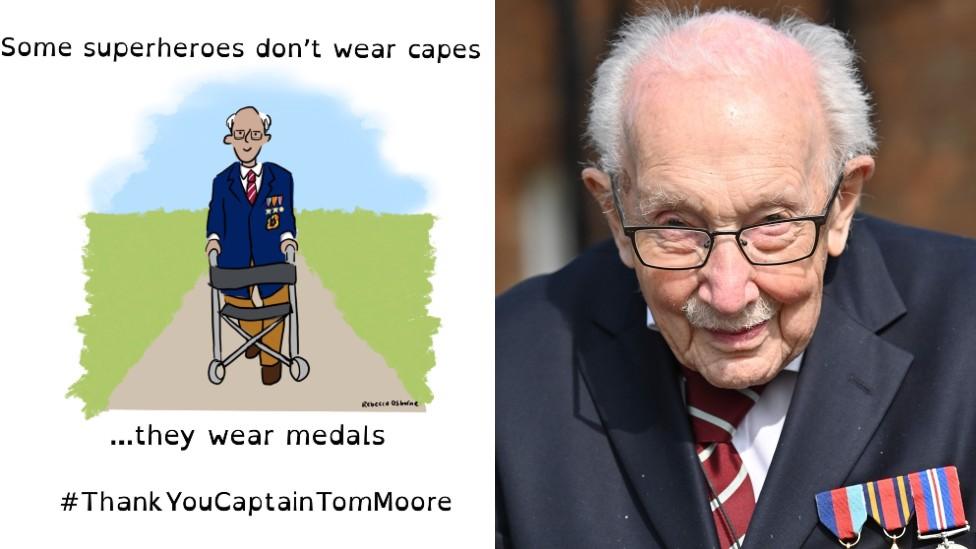Capt Tom donations: What was the £33m spent on?
- Published
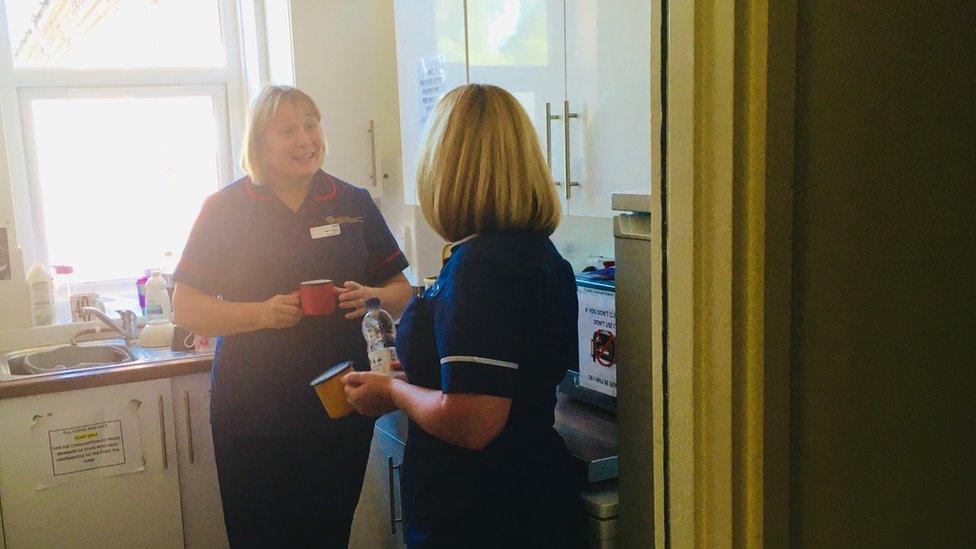
Staff used to have to bring in their own tea and coffee at one hospital in North Wales
The extraordinary fundraising achievement of Captain Sir Tom Moore was well documented last year. His determination to walk 100 laps of his garden before his 100th birthday transformed him into a defining figure of England's first national lockdown, making headlines and inspiring people from around the world to donate.
Altogether, the centenarian, who died with coronavirus in Bedford Hospital on Tuesday, raised £32.8m (£39.3m including Gift Aid) in aid of the health service's charitable wing, NHS Charities Together. It is part of an overall £150m collected for the fund as part of its Covid-19 Urgent Appeal.
Hospital staff treating the sickest patients have been under intense pressure in recent months, and a recent study suggested that many had been left traumatised by their experience during the first wave last spring.
At the time, there was much publicity given to shortages of protective clothing for staff, and the need for medical apparatus. But these are classed as "core" equipment and funded by tax payers. The focus of Charities Together is the comfort and wellbeing of staff and patients - things that, in the words of one NHS worker, "make their working lives easier". Ellie Orton, the charity's chief executive, said the donations helped staff "focus on their life saving work at a time of immense pressure".
Back in May, I spoke to NHS staff about how the money was helping.
This article was originally run on 25 May 2020.
Snacks for staff in County Durham
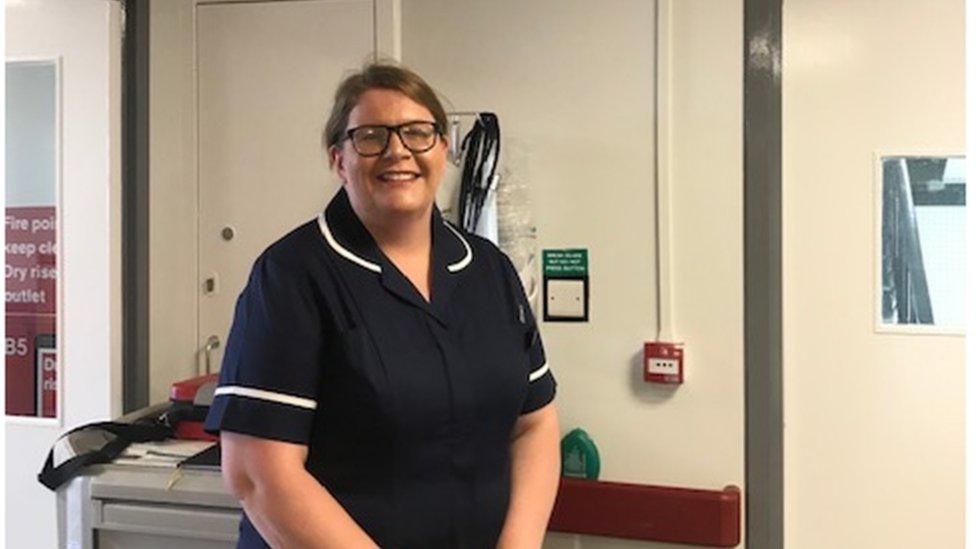
Cath Scott says staff are "extremely grateful" for the funds that have helped them "through a difficult time"
Cath Scott has just finished a six-week stint on a Covid-19 ward in Darlington Memorial Hospital when she picks up the phone. She usually manages a specialist ward for patients suffering from stomach and liver problems. But when the outbreak began, she found themselves redeployed around the hospital, working with new faces in uncertain territory.
"We're used to looking after patients with infections and things, but this has been a new virus and people were very frightened, really," she says, adding that the perks bought with the appeal money have made her job "a little bit easier in a difficult time".
Welfare packs of sandwiches, drinks and energy bars were delivered to wards at the height of the outbreak when staff were unable to take breaks or were reluctant to leave their patients. Staff were given lip balms and hand creams - for lips left chapped and dry under face masks, and hands cracked from constant washing during long shifts.
With most of the appeal money yet to be handed out, Cath hopes to see longer term improvements, too. Before the outbreak, staff had to share the few lockers they had between them or leave their handbags and phones in communal spaces during shifts. With the money from the donations, they now have one each.
"In the NHS there hasn't really been money for things like that - not luxury items, but things that aren't necessarily essential," she says. "They will make a big difference."
For Cath, the hardest part of the pandemic has been caring for patients cut off from their families. Initially staff used their own mobile phones so patients - especially the elderly ones - could, in some cases, say their final goodbyes. Now the wards have iPads, bought with the appeal money.
"That's what's made a big difference to me - that you've been able to make a big difference to the patients, rather than it being about us," she says.
Pop-up shops in the capital
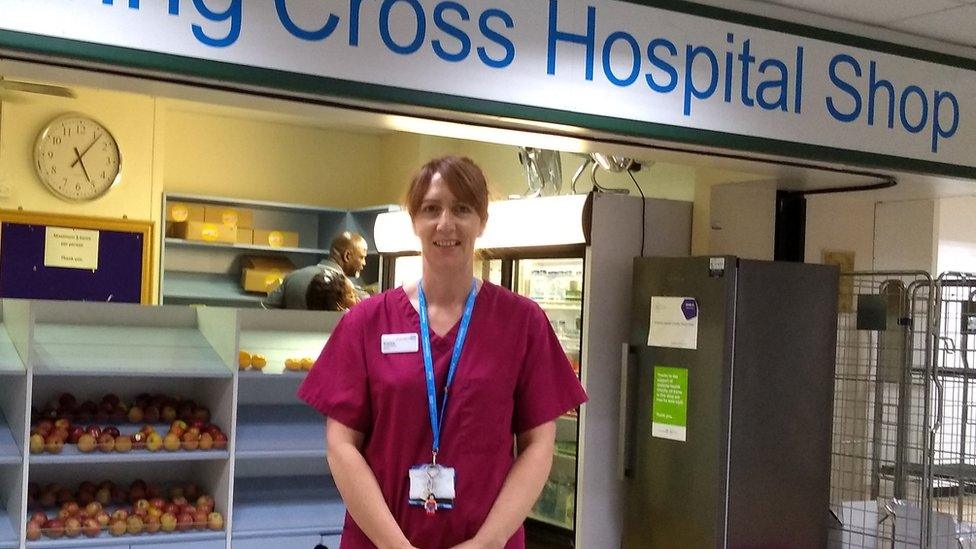
Emma Tippins pops to the hospital shop to pick up supplies for colleagues
About 250 miles away, the funds have been used to open a free pop-up staff shop in London's Charing Cross Hospital. A&E matron Emma Tippins says being able to pick up a can of Coke during a break from a 14-hour shift has made a "huge difference".
"When the peak hit, we probably had three weeks where I really didn't have many days off because I felt I should be here all the time. And wearing PPE is exhausting," she says. "And some of the work was really sad... We're used to major incidents and trauma, but this was protracted."
That is why she thinks being able to pick up a microwaveable meal or fresh fruit for free - especially for those whose partners are out of work - has been so important.
"All the kindness that we've been experiencing has had such a positive impact," she says. "Something that is so little like popping to a shop on your way home is just a bit too much sometimes."
Space to relax in Scotland
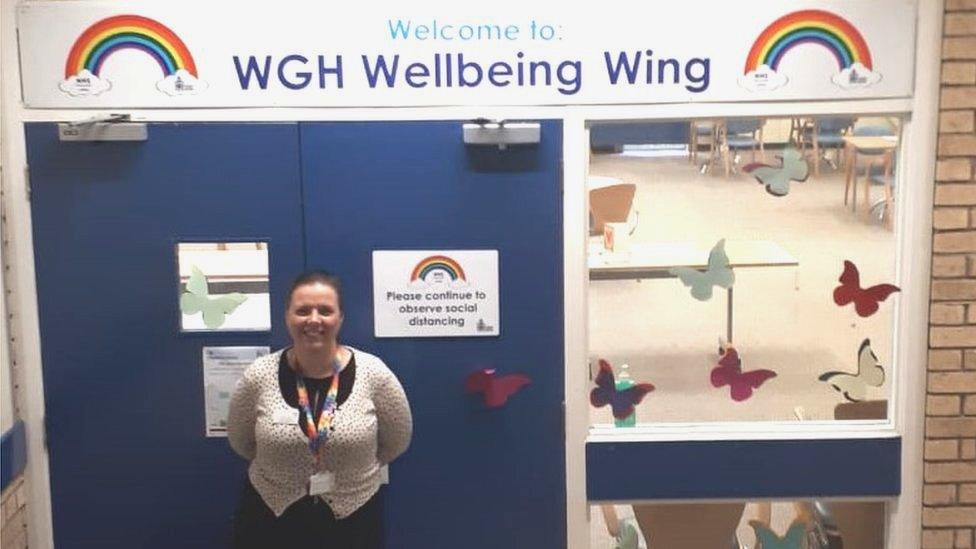
Laura Thomson says staff need to take breaks from the 'hamster wheel'
Not all of the stress caused by the pandemic has fallen on those on the wards. In Edinburgh's Western General Hospital, quality improvement adviser Laura Thomson has been helping teams adapt to new, challenging ways of working.
To help unwind, she and others have been taking advantage of the hospital's wellbeing wing - an old library which, using the donations, has been kitted out with comfortable chairs and quiet rooms. Therapists even offer staff free foot massages.
"You know when you're going really, really quickly and you're running from one thing to another?" she says on the phone. "To be able to use your break to go and do something like that - just to ground you and make you take a moment to stop and pause and relax - I actually felt lighter on my feet afterwards."
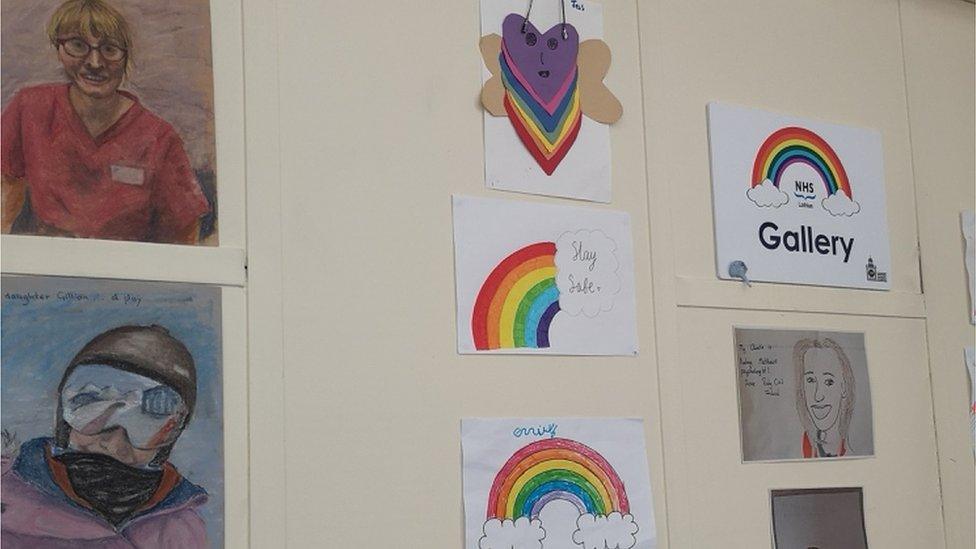
The wellbeing wing is decorated with houseplants, posters advertising a "listening service" (also funded by the appeal), and pictures drawn by staff members' children - a reminder, Laura says, to avoid "taking your troubles home with you"
Tea breaks in North Wales
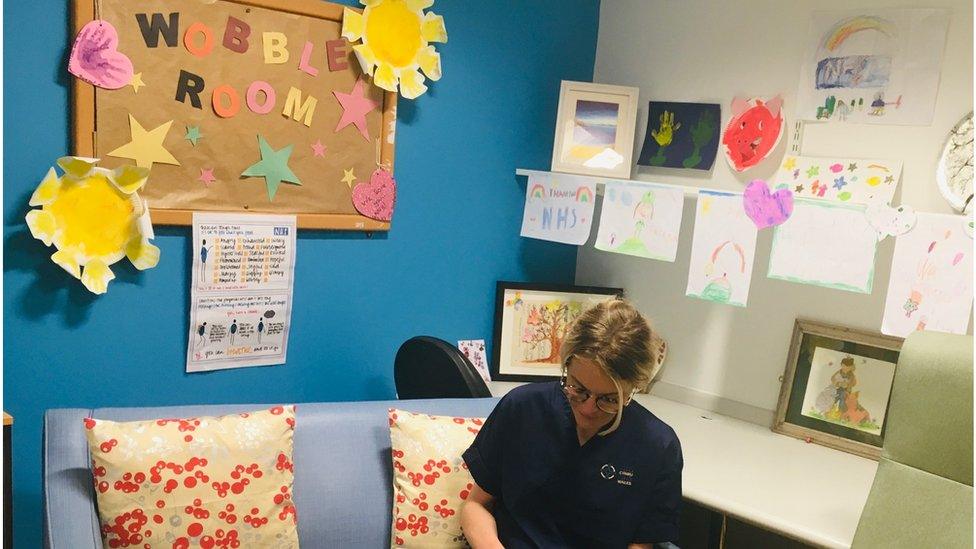
A member of staff takes time out in a "wobble room" provided by the North Wales NHS Charity
For Helen Williams, a matron in the critical care department in Wrexham Maelor Hospital in Wales, simple provisions can make a big difference: tea and coffee bought for their kitchenettes, bottles of water in the new fridges for staff working in "extreme heat".
"I've had nurses faint on duty in PPE," she says. "Just being able to come out and have a cold drink, a cold bottle of water is just unbelievable."
The money is supplementing a pre-existing nurses' fund that became overstretched as more staff were brought into her department.
"It's topping up funds so we have the opportunity to take somebody who's having a really difficult day aside and say, 'Look let's have a cup of tea, let's talk about it'," she says.
The money has also been spent on training, and Helen hopes it will also be used for bereavement support groups and a critical care garden for patients.
"For us it's much more about the small things... To help everybody heal."
Related topics
- Published3 February 2021
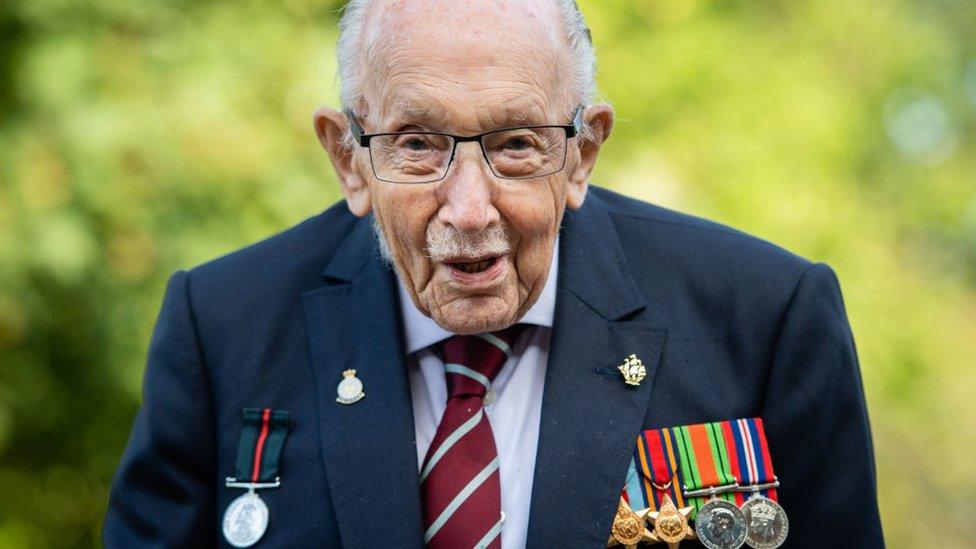
- Published2 February 2021
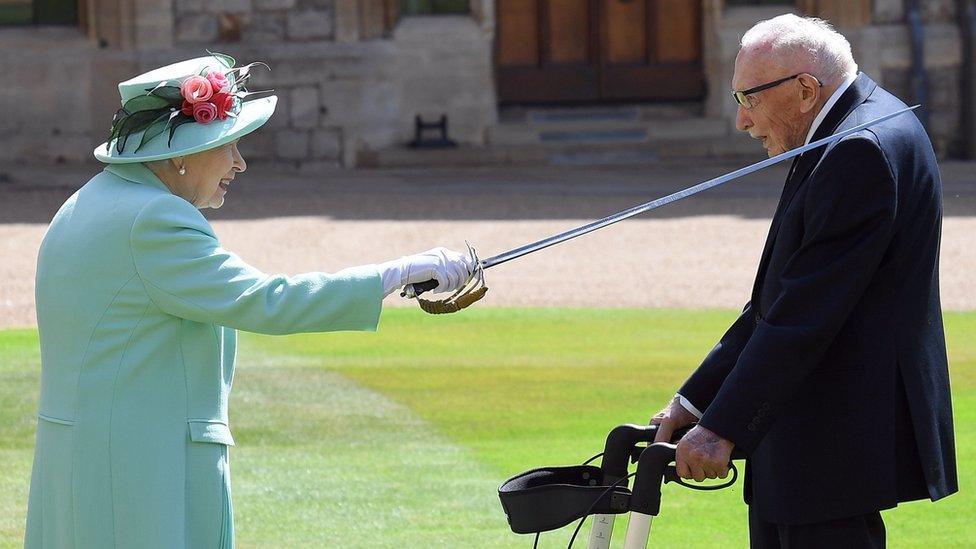
- Published2 February 2021
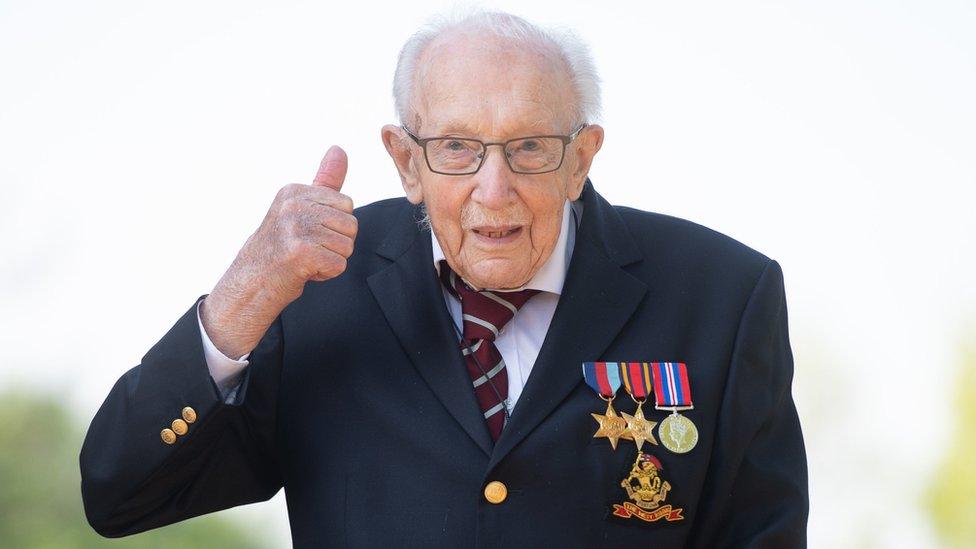
- Published30 April 2020
